- Home
- Anne Easter Smith
This Son of York Page 5
This Son of York Read online
Page 5
“You will?” Dickon wasn’t sure if he could trust this man yet. “Do you promise?”
Trollope chuckled and drew a cross over his heart. “And hope to die,” he agreed. “Now run along.” Dickon thanked him solemnly, feeling reassured, and ran off to tell his friend Piers Taggett.
Trollope straightened and his smile faded as his eyes followed Warwick’s walk across the bailey. Aye, he was under the earl’s captaincy of Calais and would be expected to obey the earl, but Trollope had taken an oath to obey King Henry long before the upstart Warwick had set foot in the Calais garrison. He harrumphed. Loyalty was a matter of convenience to this old soldier, but he decided it was too early to see which way the wind might blow in the matter of York versus Lancaster.
The harvest feast of Michaelmas was celebrated in Ludlow with its usual fanfare, despite the influx of so many soldiers billeted in and around the castle. York told the parish priest to preach a gospel of peace and harmony, letting his tenants know that the Yorkist force in their midst was merely insurance against any attack by the unpredictable queen, but that he, York, was in negotiation with the king.
The Michaelmas festivities in the castle were extended to fete Dickon’s seventh birthday, and the duke and duchess stood by watching their youngest in the place of honor shyly accept the servants’ good wishes. York whispered, “You may say he is the quietest of our brood, but he is certainly not lacking in courage. And the questions! The never-ending questions.”
Cecily nodded, chuckling. As well as carrying his name, Cecily loved the way her youngest son resembled his father, not least in the way their prominent, determined chins would jut forward while contemplating a problem. “Aye, he has spirit, but I worry for his future. What are the prospects of a fourth son?” she said.
The duke smiled indulgently at his beloved wife and stroked his tuft of a beard. “Perhaps he will surprise you, my love. He is a good listener, and I have noticed how he bristles at any injustice.” He chuckled as he remembered an example. “I chastised a boy for bringing me the wrong bow at the butts yesterday, and Dickon stood between us and reminded me that it was Tom Archer from whom I had requested the bow and surely the boy was only obeying his master. That took courage: I could have boxed his ears for gainsaying me, but I was too impressed to reprimand him.”
Dickon sat proudly as York proposed the toast to his “right beloved son,” and every one of the most important members of the Yorkist party rose and raised their cups. It was not for Edward, nor for Edmund, not even for George, but for him—for Richard Plantagenet, and he thrilled to it. The hairs stood up on the back of his neck as the rafters rang with the sound of his name, and for the first time in his life, Dickon now understood what it meant to be the duke of York’s son. He looked around at his family all smiling at him, and he swore solemnly to himself then that he would never betray any of them.
York liked his boys with him when he made forays across the Teme to ride up Whitcliff. It amused Salisbury how all four of his nephews would vie for their father’s attention. Privately, he thought York was both an indulgent father and inattentive. Ned was already a man, for Christ’s sake, and yet no mention of a bride had yet been made. He watched while Ned raced his brothers to the top of the hill. Here was surely every nobleman’s dream of a son: more than six feet tall, strong, athletic, handsome, and charismatic, Edward was always the center of attention even at seventeen. But there was an indolence that crept occasionally into Ned’s behavior, and Salisbury had noticed how the young man could not resist a pretty girl. “You should keep an eye on his philandering,” the earl had advised his sister in an intimate moment recently, but Cecily had dismissed the remark with a “Pish! He’s just a healthy boy.”
Dickon watched his two brothers enviously. George was growing into manhood, his voice changing and his lankiness filling out into athleticism. He also handled his horse superbly. Was it any wonder Dickon despaired of ever equalling his brothers in their father’s eyes. He sat sadly on his horse, unnoticed as always—or so he thought.
The early October evening was drawing in before the duke’s party cantered into the castle yard and relinquished their mounts to the grooms’ willing hands.
“Your Grace,” Roger Ree cried, exiting the keep where he had been watching for York. An over-exuberant Ambergris, waiting for his master, flung his huge body at Ned. “The king has sent his answer to your last petition, and ’tis not good news. The messenger awaits in the great hall.”
All York’s good humor following the invigorating gallop down to Ludford Bridge vanished in a scowl. Impatiently, he shouted to Ned, “Keep that dog of yours under control,” as he walked over the drawbridge followed by Salisbury, Warwick and the others. “Let us hear the king’s response.”
Dickon hurried to catch up with George and Edmund. “What does this mean?” He was almost afraid to ask. “Will Father have to go to war?”
“How should I know?” George snapped, hiding his own anxiety.
But Edmund seeing the fear in his little brother’s eyes, reassured him, “The king is a merciful man, Dickon, and he knows Father is his loyal subject. Perhaps it will not come to war.”
It became obvious to Dickon, however, that his father doubted the king’s mercy now. For the next two days, the castle and town were abuzz with the news that the royal army was approaching. From the top of the keep Dickon and George watched the completion of the extensive barricade York had ordered built on the opposite side of the river. Darkness was falling when they turned to descend the stairs, and they could see the hundreds of men lighting their camp fires and munching on their meagre rations.
Dickon shivered in the cool evening air, and George, guessing his brother was afraid and not merely cold, put his arm around him. “I hope there is a fire in the hall,” he said, cheerfully, “we’ll be warm there.” Unused to the kind gesture and certain he would be called “babykins” if he accepted the offered corner of George’s cloak, Dickon hesitated. It was enough to irritate George, who snapped, “Suit yourself,” and walked off.
George’s mercurial temper was roused again the very next day when he argued with Meg over a chess move she had made. Dickon, with Ambergris at his feet, looked up from his whittling of what he hoped would be a fair facsimile of Traveller, and was glad it was Meggie for once who was the victim of George’s outburst. “You cheated!” George accused her, leaping to his feet. “I was looking out of the window, and you moved your bishop before you moved that pawn.” Dickon cast his eyes back to his carving and waited: he knew one did not accuse Margaret of York of cheating.
“Take back that slander this instant,” Meg demanded, standing up to emphasize her height. “You are a poor loser, George Plantagenet, and you always have been. I do not have to cheat to beat you, you stupid boy. I could do it blindfolded!”
George never had a good answer to Meg’s sharp retorts, and he did not have one now. Instead he upended the entire board, and the brightly colored figures flew in all directions, startling Ambergris, who began to bark. Meg’s attendant Beatrice got to her feet “tut-tutting” and commanded George to pick everything up and apologize. George simply stormed off, pushing his sister aside.
“Holy Mother of God,” Meg swore. “I do not like George sometimes.”
“Sometimes?” Dickon muttered to his block of wood, but he put it down and went to help Beatrice pick up the chess pieces. As he righted the board, he glanced past Meg to the window and gasped.
“S…soldiers!” he stammered. “Look! They are coming over the hill.”
Beatrice shrieked and got up from her knees so quickly she knocked her high hennin askew. “Dear Lord have mercy, it must be the royal army. Quick Dickon run and alert your mother. Meg come with me.”
Dickon obeyed as fast as he could, dashing through the castle passages that ran inside the curtain wall to the solar in the Northwest Tower. But his mother wasn’t there. “She went up on the ramparts with Edmund,” Cecily’s chief attendant, Gresilde, told the bo
y, her face pale when she heard Dickon’s news. “She must have seen them, too.”
Not waiting for further instructions, Dickon scampered up the circular stairs to the roof of the tower. There he saw his mother and brother staring horrified at the thousands of troops massing across the Whitcliff hill, the royal pennants and banners as thick as any forest.
The shrill alarm from a shawm was real this time, and soon the air was filled with pealing bells, loud trumpets, and most frightening of all for those inside a castle, the grinding sound of the portcullis being lowered and the drawbridge raised against attack. Dickon ran to his mother’s side, terrified. Edmund swept him up in his arms, and Dickon was surprised to see fear in his brother’s eyes, too. It made him feel better that he was not alone.
“Come boys, we must prepare for our royal visitors,” their mother said airily, as though the king was here merely to dine with them. Despite himself—and the threatening horde at the gates—Edmund managed a smile.
Dickon stared at his mother’s retreating figure in astonishment. Prepare for the visitors? Is she serious? Doesn’t she know fear? he wondered. If the duchess was not afraid, then perhaps he could pretend he wasn’t either.
“You will fight the king?” Dickon whispered, daring to question his father, who had come to wish his boys goodnight. “What about the attainting thing?”
“Dickon!” George hissed, making York smile wanly.
“’Tis his right to ask, George. It is in God’s hands now, Richard. But I must save England,” he said and drew the boy to him. “It would be Englishman against Englishman,” he told them both, “and nobody wants that. So I suspect the king will relent. Pray for me and your brothers. Pray very hard, and perhaps the king will see reason and go away.”
But Dickon could not let it rest. “If you do fight the king and win, Father, who will be king then? Will it be you?”
Was this the right time to wend his way through the Yorkist claim to the throne, Richard wondered. Nay, he would wait to explain the vagaries of the Plantagenet family tree that had led King Henry VI to sit on the throne. Some day, he would have to explain how, when the fourth Henry, called Bolingbroke, deposed his cousin Richard II at the end of the previous century, he had skipped over one of his uncles, Lionel, second son of Edward III, whose sole progeny, and thus insignificant, was a daughter. But Richard of York was descended from that daughter as well as from Edward III’s fourth son, Edmund of York. No one had questioned—or challenged—the Lancastrian line to the throne until now, and it was only because of this Henry’s inability to govern that York was asserting his claim. All this passed through York’s mind as quickly as he chose instead to say: “Edouard, prince of Wales is heir to the throne as you well know, Dickon, should the king die….” he paused, “…let us leave it at that for now. God give you both a good night. We can talk more on the morrow.”
“But…but, do you want to be king, Father?” The question was innocently asked but that night it exasperated York.
“Have I not told you a thousand times nay, I do not desire to wear the crown. Now, enough of your questions, my lad. Say your prayers and go to sleep. The men are waiting.”
He kissed both boys and left the room to return to the great hall. He had sent many of the troops to camp at the foot of the hill across the river from the king’s huge force. He had also ordered several volleys from cannons on the walls to be fired during the day to warn the royal army to come no closer. Now as twilight closed out the day, it was time to prepare for battle.
Dickon dutifully said his prayers and climbed into the soft tester bed. His father may have answered his questions of kingship, but there had been another hanging on the boy’s lips that he had not dared voice: “What happens if you die, Father?”
How could he sleep, worried so about such a calamity?
No one noticed the small, pale face peering down at the departing knights from the minstrels’ gallery. As soon as the tapers had been extinguished but for one night light, Dickon had slipped out of bed and run along the passageway to the gallery above the great hall. He had arrived in time to see his parents’ loving farewell directly below him, shielded from the others by the massive aumbry. It was not the first time he had witnessed his parents’ affection for each other, but he was troubled by his mother’s tears. Was she afraid after all? He had never seen her cry before, and he curled up against the balustrade wondering: Would his father die? Would Ned and Edmund? And he began imagining them lying on the bloodied ground with half their faces ripped away, and he could not stop trembling.
Servants quietly extinguished the torches in the hall below, leaving only the flickering firelight to cast eerie shapes upon the walls. Dickon, in his fear, fancied he saw his father’s and brothers’ shadows walking there and hurriedly crossed himself in his dark hiding place, wishing he were back in bed. There was now no ambient light from the hall in the passageway, where grotesques or ghosts might be lurking that were far more real to the boy than the king and his army menacing the town across the Teme. He begged his favorite St. Anthony to protect him.
No help came for the devout little boy huddled half asleep and cold in the little minstrel gallery as an hour dragged by. Then suddenly Dickon was jolted awake by the flinging open of the massive door to the hall, and the boy heard his father’s urgent, angry voice. “Light! Give us light, I say!” Sleepy servants jumped up from their makeshift beds by the fire to obey the duke. The other lords, now fully harnessed, clanked in behind him. By now Dickon was wide awake. Had there been a battle and had he slept through it? But nay, none of the men looked bloody or even dirty.
“That whoreson traitor Trollope!” York cried. “If I ever find him, I’ll string him up by his bollocks…”
Warwick sneered. “Nay, my lord, that will be my pleasure. Trollope is…was under my command.”
Captain Trollope? The nice man with the twinkly eyes? What had he done?
Dickon returned his attention to his father’s fury—or was it fear—and his mother’s clumsy attempts to calm the duke as she tried to unbuckle his sword. “What happened, my lord?” she asked her husband, but before York could answer, Warwick’s commanding voice bellowed.
“Those sons of bitches! My own men of Calais. Pah! Traitors and cowards all! May they be damned in hellfire!”
Dickon, whose heart was thumping, heard his father announce that Trollope had deserted the Yorkists and in the cover of dark had gone over to the king’s side, taking all of the Calais troops with him and more besides. “In the end, the turncoats claimed they could not bear arms against their king.”
Traitor? That word again! Dickon knew all about that word, remembering the story of his grandfather. But Trollope had promised to speak up for him with his father. He crossed his heart and promised, he remembered, feeling again the desolation of betrayal; trust would be harder to bestow after this. His heart constricted, and he felt cold.
Then Ned surprised Dickon. Magnificent in his breastplate and mail that made him look like a warrior god, he too cried: “God damn them! Traitors, all!” Dickon was transfixed as the hall resounded with the echoed words from others. “Traitors! Traitors!”
So many traitors, Dickon thought, gazing sadly at his father. So much disloyalty. As he listened to his father bark orders and make arrangements, he resolved never to be a leader. The gravity of the decisions the duke of York was having to make for everyone in the room—nay, the whole army—may not have been understood by the youngster, but he took note of his father’s anguished face and felt the tension mounting in the men below. They had to trust their leader, didn’t they? He trusted in Father, but would these Yorkists? Would they stay loyal in the face of danger? He knew he would because he could not yet imagine turning his back on his family—right or wrong—but could they? He watched and shivered.
“Dickon! What are you doing there, mon garçon?” Constance’s voice came from behind and startled the boy. He put his finger to his lips and, peering over the railing, she was ast
onished to see the hall filled with the same soldiers she had seen leave an hour before. Meg’s coughing had drawn her to the children’s quarters where she had noticed Dickon was missing, and hearing voices in the direction of the great hall, she guessed he must be there. She drew her bedrobe more tightly around her and looked down on her beloved mistress, who was obviously distressed.
“Captain Trollope is a traitor, Constance,” Dickon whispered, turning a distraught face up to hers. “He has betrayed Father. And I liked him very much. But now he has gone to join the king and taken a lot of men with him.”
“Sacre Vierge!” Constance mouthed, understanding the disaster at once. The Yorkist army would be hopelessly outnumbered and could not possibly hold the town against the king’s forces. She knew she ought to take Dickon to his bed, but instead she knelt down next to him and covered his shoulders with her shawl. “You should not be here, you know,” she admonished the boy, but she enveloped him warmly and let him stay to listen. It was his fate, too, she knew.
As the leaders huddled making a plan, Cecily went to sit on the steps of the dais, and Constance saw her eyelids droop and her body sag with exhaustion and worry. Aching to support her mistress but loath to leave Dickon, she coaxed him to go with her down to the hall, where they slipped in and joined Cecily. The duchess was too tired and unnerved to chastise either Constance or the boy for being there.
“Take my hand, Mother,” Dickon whispered, looking up into Cecily’s tear-stained face. “Constance and I are here to comfort you.” Cecily’s wan smile cheered him as she took his hand, drew him close and gave him a squeeze. Mother is trembling, Dickon thought, an odd protective feeling surprising him.

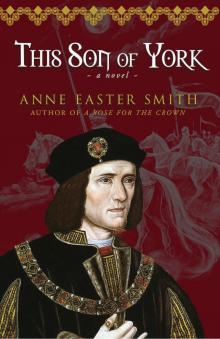 This Son of York
This Son of York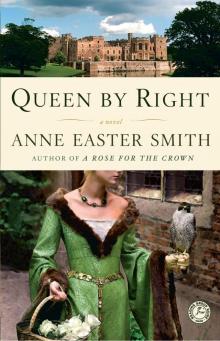 Queen By Right
Queen By Right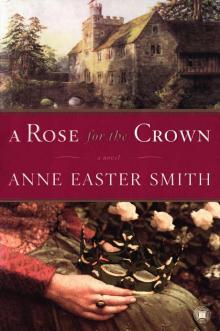 A Rose for the Crown: A Novel
A Rose for the Crown: A Novel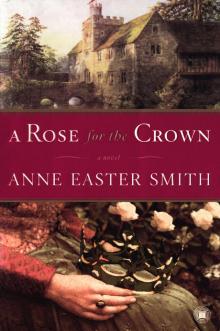 A Rose for the Crown
A Rose for the Crown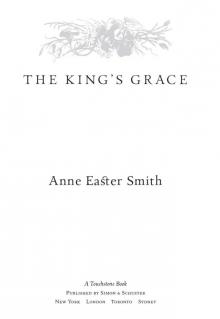 The King's Grace
The King's Grace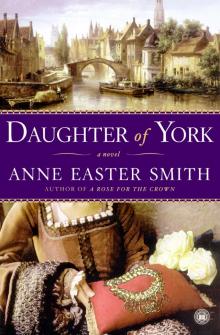 Daughter of York
Daughter of York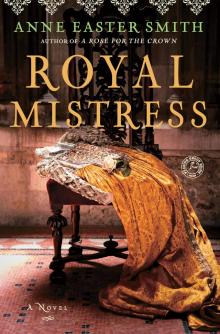 Royal Mistress
Royal Mistress